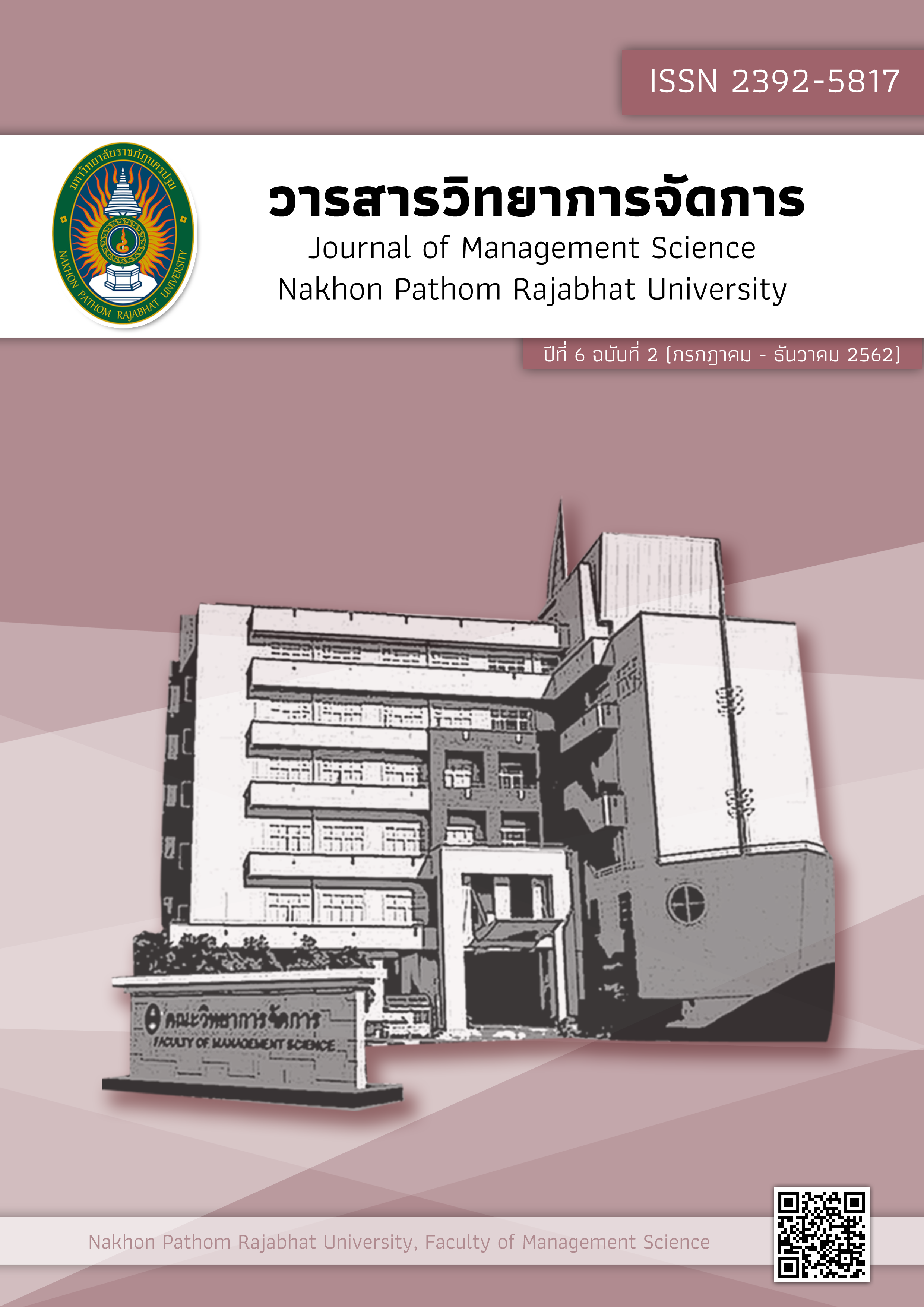The Technological Impacts Thailand 4.0 Policy towards The Changes in Professional Accounting
Main Article Content
Abstract
Thailand 4.0 policy has important impacts on management and organizations, especially in the accounting area. The implementation of Thailand 4.0 policy should help reduce the accounting work process more compact and smart to be driven by technology. It can also help the development of good organizational structure and add value to business.
The objective of this research was to study technological impacts of Thailand 4.0 policy on changes in professional accounting works which will be affected the electronic document system and accounting information system and other information systems were used in the organization. The online questionnaires were used in this research. This data were collected from the population of accounting professionals who are undergraduate accounting graduates from Nakhon Pathom Rajabhat University, 195 people, get 173 samples in the completed questionnaire. The data were analyzed by using stepwise regression. The result showed that two factors have been affected by Thailand's policy 4.0, the first factor is tax online system (X1), the 2nd factor Accounting Information System in office (X2). The results of the research are as follows:
Electronic document system Y1=37.754+0.25X1 ;R2=0.047
Accounting information system Y2=12.911+0.35x1+0.532x2 ;R2=0.165
Other information system Y3=45.511+0.282x2 ;R2= 0.065
As of financial technology, there was no statistically significant change in accounting practice through the office information system.
Article history : Received 3 June 2019
Revised 3 September 2019
Accepted 13 September 2019
SIMILARITY INDEX = 0.00
Article Details
The views and opinions of the article appearing in this journal are those of the author. It is not considered a view and responsibility of the editorial staff.
References
สุวิทย์ เมษินทรีย์. (2559). Thailand 4.0: “สร้างความเข้มแข็งจากภายใน เชื่อมโยงเศรษฐกิจ.ไทยสู่โลก” eco-challenge magazine,11(3), 5-9.
สุชาดา กรวิทยาศิลปะ. (2559). นักบัญชีกับประเทศไทย 4.0. [ออนไลน์]. ค้นเมื่อ 2 ธันวาคม 2560. จาก https://www.fap.or.th/images/column_1477650726/Thailand%204_0.pdf
Thai quote. (2560). 10 อาชีพที่ตลาด- แรงงานต้องการ. [ออนไลน์]. ค้นเมื่อ2 ธันวาคม 2560. จาก https://www.thaiquote.org/content/21054
Jackling, B.,& De Lange, P.(2009). Do accounting graduates’ skills meet the expectations of employers? A matter of convergence or divergence. Accounting Education : An International Journal, 18 (4/5), 369-85.
James H. Long and Jonathan D. Stanley (2012). Managing Interruption in the Accounting Workplace. THE CPA JOURNAL, 60-63.
James fanto (2016). Dashboard compliance: benefit, threat, or both? Brook. J. Corp. Fin. & Com. L. vol 11
Mock, T. J., Srivastava, R. P., & Wright, A. M. (2017). Fraud Risk Assessment Using the Fraud Risk Model as a Decision Aid. Journal of Emerging Technologies in Accounting, 14(1), 37-56. doi: 10.2308/jeta-51724
Mike Padberg (2015). Big Data and Business Intelligence: a data-driven strategy for e-commerce organizations in the hotel industry, Retrieved May 20,2017 https://essay.utwente.nl/68095/1/Padberg_MA_MB.pdf
Tempone, I., Kavanagh, M., Segal, N., Hancock, P. Howieson, B. & Kent, J.(2012). Desirable generic attributes for accounting graduates into the twenty-first century: The views of employers. Accounting research journal, 25(1), 41 – 55
Thomas Tam. (2013). What IT knowledge and skills do accounting graduates need?, New Zealand Journal of Applied Business Research. 11(2), 23-42.
Von Leipzig, T., Gamp, M., Manz, D., Schöttle, K., Ohlhausen, P., Oosthuizen, G. and von Leipzig, K. (2017). Initializing Customer-orientated Digital Transformation in Enterprises. Procardia Manufacturing, 8, 517-524. doi: 10.1016/j.promfg.2017.02.066


